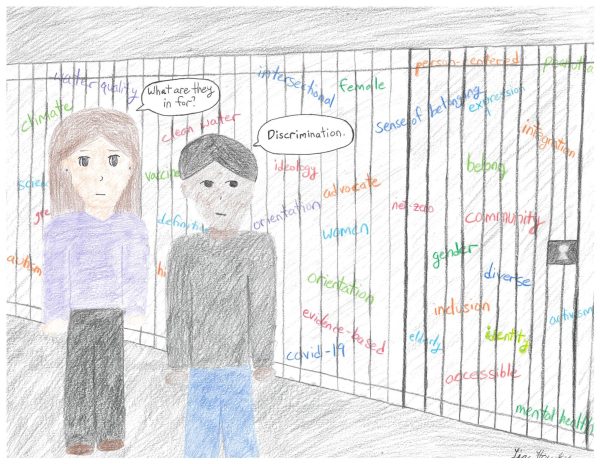In the Spotlight: Mental Illness
Meghan Markle brought light to the issue of mental health, and the stigma that surrounds it in her recent quote, “No, I’m not okay.” addressing the often overlooked question, “Is it okay to not be okay?” This rare acknowledgement of such a taboo topic is crucial to bringing awareness to a disease such as mental illness that affects individuals across the nation.
According to David Lyons, a senior at Hall High School, “Mental health issues are common, so they should not be hidden.”
As the National Alliance for Mental Health (NAMI) noted, “1 in 5 U.S. adults experience mental illness each year. 1 in 25 U.S. adults experience serious mental illness each year.” People now, more than ever, must be aware that it is okay to be sad, because they are certainly not alone in this feeling. However, it is not only important to acknowledge your own issues but also those of the individuals around you.
Mrs. Anna Capobianco, an AP Seminar teacher at Hall High School, shares that she believes, “creating awareness is the first step to breaking the stigma around mental health.”
Mrs. Capobianco also expressed that to help those suffering, teens must “advocate for their peers just like they would for someone physically suffering.” Although, this is always easier said than done.
To become a more inclusive high school, Hall must follow certain steps for a better future. First, Hall should ask its community about the incorporation of mental health into the health class curriculum or as an extracurricular course.
Mollie Hall, sophomore at Hall High School, explained that health may not be the best option to embody this topic. Mollie believes that in health lessons students are more focused on memorizing the content than actually conceptualizing it for future use.
Instead, and in agreement with David, she suggested that there should be workshops or “a class dedicated to discussing mental health in everyday life” in order to be of most benefit to students. Lyons acknowledged this issue stating that there should be an elective offered to students interested in becoming better educated about the subject.
It is also crucial that Hall, as a school, takes steps to incorporate the subject in everyday classes to break the stigma. Mrs. Capobianco emphasizes that “Exposure to topics is what makes people feel comfortable with talking about them.” It is only by making mental health a regular topic of discussion that it will be able to break the stigma.
There are steps that should be taken when starting the conversation. Lauren in Time for Change, clarifies the following as ways to break the ice: “(1)Don’t wait for the perfect moment…(2)Ask twice…(3)Talk about yourself…(4)Approach the elephant in the room…(5)It doesn’t have to be face to face.”
Although today people are more open about their mental health, this has only been a recent change in history. In the past, someone experiencing mental illness’ was often kept secret.
Today’s current stigma surrounding mental illness is a direct result of history. In the past, individuals who needed psychiatric assistance for mental disorders, were removed from society and placed in institutions, in fear their “disease” would spread.
Jenev Cadell, author of How to Cope With Stigma When You Have a Mental Illness, shares, how in previous times psychiatric patients were described “as having the mark of the devil.” These individuals were forced to endure inhumane torture for their different brain chemistry directly mirroring the pattern where society exlcudes individuals that are divergent.
The stigma around mental health is harmful for those affected as they become too afraid to discuss the issue. Like the Princess of England exemplified, speaking out about mental health should remain in the spotlight. Sharing your mental state and checking up on peers will shift the conversation on mental illness to be more positive as ways to help those suffering can be publicly discussed and put into action.







Grace Gillis • Nov 7, 2019 at 1:47 pm
I really like this. It is good to address these things and you guys did a great job at not stigmatizing mental illness and just speaking about this issue. I really like how you got this idea from that quote as well, I would not have realized it was so significant without your point of view.